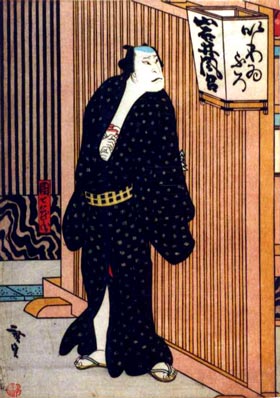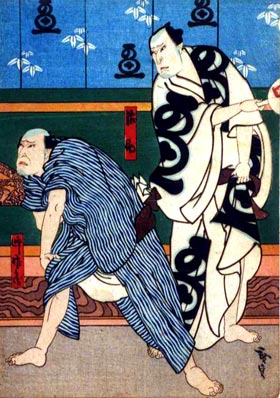| YADONASHI DANSHICHI |
| Play title | Yadonashi Danshichi Shigure no Karakasa |
||||||||||||||||||||||||||||||||||||||||
| Author | Namiki Sh˘z˘ I | ||||||||||||||||||||||||||||||||||||||||
| History |
"Yadonashi Danshichi Shigure no Karakasa", commonly called "Yadonashi Danshichi" (literally "Homeless Danshichi"), was most likely premiered in the 9th lunar month of 1767 in Ky˘to at the Kitagawa no Shibai (casting unknown) but, for some important sources, the official premiere happened in the 7th lunar month of 1768 in ďsaka at the Takeda no Shibai [casting]. It was staged in ďsaka ˘shibai for the first time in the 6th lunar month of 1770 at the Kado no Shibai [casting]. "Yadonashi Danshichi" was a very popular sewamono in Ky˘to and ďsaka, in both ˘shibai and koshibai, but was never staged in Edo during the Edo period and the Meiji era. It was produced in T˘ky˘ for the very first time in September 1924, at the Hong˘za. It is now closely associated to the Nakamura Ganjir˘ line of actors. |
||||||||||||||||||||||||||||||||||||||||
| Structure |
"Yadonashi Danshichi" is made up of 3 acts (divided into 6 scenes): |
||||||||||||||||||||||||||||||||||||||||
|
|||||||||||||||||||||||||||||||||||||||||
| Key words |
Arashi Sangor˘ Danshichimono Kamigata Kabuki Namiki Sh˘z˘ Sawamura Kunitar˘ Sewamono Sum˘tori Tazaemonbashi |
||||||||||||||||||||||||||||||||||||||||
| Summary |
Introduction The hero is Danshichi Mohŕ, the son of a respectable samurai called Utagawa Jingoemon of the Minatogawa clan. He is a noted swordsman and wrestler, but is equally renowned for the shortness of his temper which has frequently brought him into troublesome situations. When the play starts, he is in disgrace for having lost a precious short sword called Niji Yoshimitsu entrusted to him by his feudal lord. To eke out a living, he has become an auctioneer in the fish market at Sakai, where his powerful personality, no less than his distinctively checked kimono, has made him a prominent figure. His enemy is one Takaichi Kazuemon who, out of jealousy for Danshichi's father, has in fact caused the precious sword to be stolen and (need it hardly be added?) is the choleric fish auctioneer's rival for the favours of the courtesan Otomi. Act I, scene 1: Sakai no Hama Uoichi Danshichi and his fellow fishmongers are gossiping at the end of the day's work. Danshichi tells them his story and laments that his cursed temper has so far ruined every effort he has made to re-establish his fortunes. In a fit of depression, he tattooes himself on the arm as a constant reminder of the danger of giving way to his instinct for violence. At this point, Iwai-buro Jisuke, the owner of the Iwai bathhouse, who has been listening to Danshichi's tale, reveals that he is in possession of a short sword which seems to answer the description given by Danshichi. This revelation is not, however, as innocent as it seems. Jisuke knows all about Danshichi and, furthermore, he has no real intention of helping him. He knows that the sword is useless without the proper accompanying certificate. Having obtained possession of the sword, he aims at using Danshichi to find the certificate which he suspects is in the hands of Takaichi Kazuemon. He then plans to make off with both sword and certificate and collect the reward. The ingenuous Danshichi is delighted with this discovery and decides to leave for ďsaka to prosecute the search for the certificate. Act I, scene 2: Sakai no Minami Shibai-mae Gonbŕ, a brothel-keeper, is in need of funds and has decided to sell his rights in the courtesan Otomi to Takaichi Kazuemon, Danshichi's rival. The affair is arranged by Jisuke. Otomi is surrendered and leaves with Jisuke to go to her new master. In the meantime Kyűshichi, a former servant of Kazuemon, but now employed in a brothel, is conspiring with various shady characters - Jűmonjiya Kumoemon, a sum˘ wrestler, and Tora and Hachi, both professional gamblers - to attack Danshichi. The trouble is that none of them knows Danshichi very well by sight. They know, however, that he always wears a certain boldly checked kimono and finally decide that that should be enough for purposes of identification. Otomi returns to the theatre where she hopes to find her lover Danshichi and acquaint him with her news. She is accosted by the sum˘ wrestler, Manriki Ichiemon, who tries to snatch her purse. The purse falls down a well, Otomi runs away, and Ichiemon climbs into the well to retrieve the prize. Danshichi enters seeking Otomi but is at once apprehended by Kawakyű, the owner of the Naniwa tea-house, to whom he owes money. Armed by the law, Kawakyű seizes Danshichi's clothes off his back as part payment of his debt. The fishmonger, resolved not to lose his temper, catches sight of Ichiemon's bundle of clothes near the well and covering his nakedness with them, goes off to find Otomi. The wrestler emerges from the well with the purse. To his chagrin it contains nothing but two play bills - not even an advertisement for the sum˘ matches in which he is competing. He then discovers the loss of his clothes, but seeing Kawakyű with a bundle of garments, seizes them from him. He has hardly put them on, however, when he is attacked by Kyűshichi and his fellow villains. Danshichi observes the scene from afar and, realizing the significance of it, makes off in high spirits. Act II, scene 1: Iwai-buro Otomi is under pressure from Jisuke and his wife Okaji to break with Danshichi completely. They hope to use her in their plot to recover the certificate and are sufficiently indiscreet as to give her some hint of their real purpose. She pretends to comply with their wishes and, when presently Danshichi finds her, she plays her part with commendable skill. The fishmonger boils with rage at this infidelity, but, although he does not realize it at the time, this is the second occasion on which his self-control is to further his search. Act II, scene 2: Namiki Sh˘z˘ Uchi Namiki Sh˘z˘ is writing when Danshichi enters. He knows the story of Danshichi's misfortunes and makes no difficulty about lending him money to continue his search in Ky˘to. Two actors, Arashi Sangor˘ and Sawamura Kunitar˘, call on Sh˘z˘ and, in an attractive scene, discuss with him a forthcoming production in which the heroine is to be murdered. Danshichi, who has been shaving Sh˘z˘'s head, finds this conversation altogether too suggestive and, secreting a razor in his bosom, abruptly leaves to the astonishment of all present. Act II, scene 3: Moto no Iwai-buro Kazuemon comes to claim Otomi and hand over the sword certificate to Jisuke. Danshichi bursts in, intending to kill Otomi, but seeing Kazuemon attacks him instead. A desperate fight develops. Act III, scene 1: Tazaemonbashi The fight continues in the moonlight. Danshichi slays Kyűshichi and another of Kazuemon's jackals, called Sahei. Then he kills Kazuemon himself. In his subsequent reaction, he thinks of committing suicide, but his hand is stayed by Jisuke, who, struck by Danshichi's gallantry, has suffered a change of heart. He gives Danshichi the sword, the certificate and Otomi and sends the two lovers off to start a new life together. Aubrey and Giovanna Halford in "The Kabuki Handbook" |
||||||||||||||||||||||||||||||||||||||||
| Trivia |
So far this typical ďsaka sewamono has been staged only once at the Kabukiza [more details] ! |
||||||||||||||||||||||||||||||||||||||||
 |
 |
|
The actors Nakamura Utaemon IV, Ichikawa Ichitomo and Kataoka Ichiz˘ I playing the roles of Danshichi Mohŕ, Sahei and Iwai-buro Jisuke in the drama "Yadonashi Danshichi Shigure no Karakasa", which was staged in the 5th lunar month of 1851 at the Naka no Shibai (print made by Utagawa Hirosada) |
|
|
|
| Contact | Main | Top | Updates | Actors | Plays | Playwrights | Programs | Links | FAQ | Glossary | Chronology | Illustrations | Prints | Characters | Derivatives | Theaters | Coming soon | News |